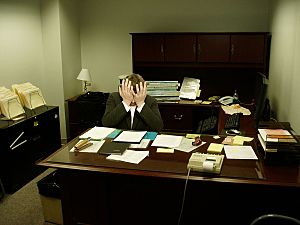Frustration facts for kids
Frustration is a common and strong feeling that happens when things don't go as planned. It's a mix of feeling angry, annoyed, and sometimes sad because something you wanted or hoped for didn't happen. Everyone feels frustrated at some point, whether it's a small thing like a game not working or a bigger challenge like not understanding schoolwork.
Contents
What Causes Frustration?
Frustration often comes from not being able to reach a goal or get what you want. It can also happen when you face obstacles that seem hard to overcome.
Blocked Goals
Imagine you really want to build a tall tower with blocks, but they keep falling down. This can make you feel frustrated. It's because your goal (a tall tower) is being blocked. Other examples include not getting a good grade you studied for, or not being picked for a team.
Unexpected Problems
Sometimes, frustration comes from things that surprise you. Maybe you planned to go to the park, but it starts raining heavily. Or your internet stops working right when you need it for homework. These unexpected problems can make you feel stuck and frustrated.
Feeling Helpless
When you feel like you can't control a situation, it can lead to frustration. For example, if you're stuck in a long line and can't move, or if a friend isn't listening to you. This feeling of helplessness can be very annoying.
How Frustration Feels
Frustration can show up in different ways. It might feel like a knot in your stomach or a tense feeling in your shoulders.
Physical Signs
Your body might react to frustration. You might clench your teeth or fists. Some people feel their heart beat faster or their face get red. It's your body's way of showing you're upset.
Emotional Signs
Besides anger and sadness, frustration can also make you feel impatient. You might get easily annoyed by small things. Some people feel like giving up when they are very frustrated.
Dealing with Frustration
Learning to handle frustration is a very important skill. It helps you stay calm and find solutions.
Take a Break
When you feel frustration building up, it's often helpful to step away. Go for a short walk, listen to music, or do something else for a few minutes. This can clear your head.
Talk About It
Sharing your feelings with a trusted adult or friend can help. Sometimes just talking about what's bothering you makes it feel less overwhelming. They might even help you find a solution.
Problem-Solve
Once you're calmer, try to think about the problem. Can you break it down into smaller steps? Is there another way to reach your goal? For example, if your blocks keep falling, maybe you can try a different design.
Learn and Grow
Remember that frustration is a normal part of life. It can even help you learn. When you overcome something that frustrated you, you become stronger and more skilled.
Images for kids
See also
 In Spanish: Frustración para niños
In Spanish: Frustración para niños
 | Aaron Henry |
 | T. R. M. Howard |
 | Jesse Jackson |



